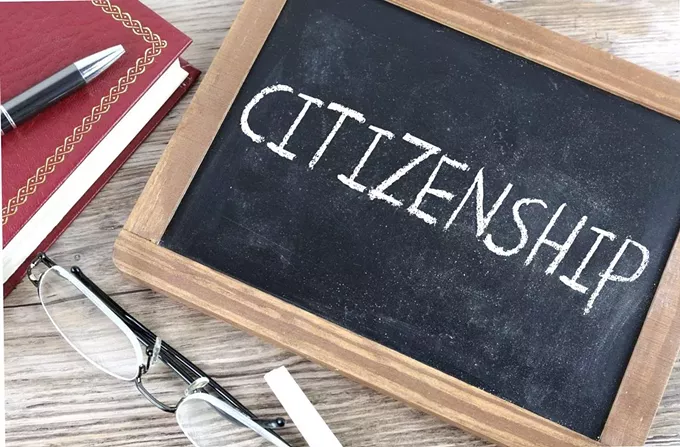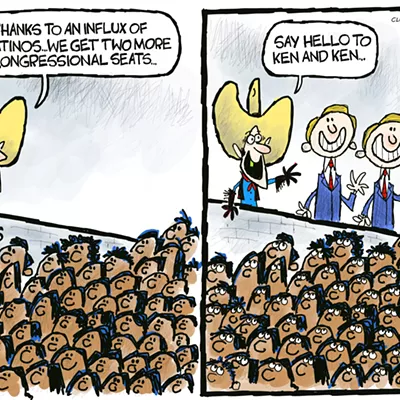Tuesday, October 26, 2021
Arizona business executives: Path to citizenship a tool to combat labor shortages
Time is running out for Senate Democrats to deliver millions of undocumented immigrants a path to citizenship that their families and advocates nationwide have been clamoring for years, and some business leaders in Arizona are emphasizing the economic benefits of a path to legalization.
In a letter to U.S. Sens. Mark Kelly and Kyrsten Sinema, 32 business leaders, elected officials and heads of nonprofits asked them to ignore the recommendations from the Senate parliamentarian, who twice rejected a plan to include a pathway to citizenship in a budget reconciliation plan.
“It has never been more urgent to achieve immigration reform to boost our economy, address our labor shortage, level the playing field for all workers and to support families,” the letter read. “The urgency is clear, the benefits are undeniable, the legislative vehicle is on the table and there is bipartisan popular support for action. We can not let this opportunity slip away. Our nation can’t afford (that) and neither can Arizona.”
Former Republican state senator Bob Worsley organized the coalition that signed the letter, which includes executives of real estate, construction and retail companies, Mesa Mayor John Giles, and Nogales councilwoman Liza Montiel.
“We have less than a couple of weeks to try to get some immigration reform into reconciliation,” Worsely said. “I’m afraid that, if we don’t get something in there, we are back to square one where we were earlier this year after Biden was elected.”
Worsley co-leads the American Business Immigration Coalition, an organization that has spent the year meeting with members of Congress to rally support for a pathway to citizenship for young immigrants who arrived in the country as children (commonly called dreamers), Temporary Protected Status holders, farmworkers and essential workers.
He said the group had been making strides in its effort to get Republicans in the Senate to commit to passing a pathway to citizenship. But the Republican Party — including Arizona Gov. Doug Ducey and Attorney General Mark Brnovich — has zeroed in on criticizing President Joe Biden’s border crisis at the expense of reforms to the immigration laws that are overdue, he said.
“We know the path with bipartisanship, and it fell apart,” Worsley said.
He thinks of the families that he has met over the years as a faith leader in Mesa. Worsley said he knows the need for more humane ways to live in the US, and Arizona businesses are in crisis due to a labor shortage.
“We need to get this fixed,” he said. “We need to have a way for people to come over the border legally, through the ports of entry, know who they are, allow enough to come to fill the jobs we need and let them go home when they want to to see their families, to visit, to go back to funerals. All these things are being denied to this class of people because of Republican and far-right nativism and racism.”
Worsley’s political career was built on fighting against immigration restrictionism: He won election to the state legislature in 2012 after defeating Russell Pearce, a leader in the anti-immigrant nativist movement and a former state Senate president, in a GOP primary.
It’s unclear whether Kelly or Sinema fully back a pathway to citizenship for undocumented immigrants through reconciliation. Kelly has said he supports that process for dreamers, and generally supports earned citizenship for farmworkers, essential workers and TPS holders. Sinema has objected to the price tag of the budget package, but she’s ignored questions from activists and constituents who’ve asked her to commit to passing a pathway to citizenship.
While the Senate plan isn’t fully set in stone, there are approximately 149,800 undocumented immigrations in Arizona who would have the opportunity to get a permanent immigration status through the proposed reconciliation package, according to an estimate from the Center for American Progress.
Labor shortages are crippling industries right now
For Steven Chanen, who has operated a general contracting firm for 66 years, the labor shortage that the construction sector is experiencing is too severe. On a typical commercial project, his company sees about 600 workers on site, from construction managers to electricians, plumbers, steel workers, carpenters, and roofers.
“Each and every one of those 600 workers is getting more and more difficult to find,” he said. “As a whole, it’s hampering the Arizona economy and the U.S. economy.”
The labor shortage, Chanen said, is compounded by a material shortage where manufacturing and transportation are also in need of workers.
“There is an immediate demand for workers,” he said. “These workers are already here in the U.S. and, from my personal experience, these would be great workers to be added to the labor pool, great for Arizona’s economy.”
Kimber Lanning, CEO of the small business group Local First Arizona, said besides the labor shortage in construction and trades that is hindering development in Arizona, the hospitality sector is also in crisis.
“We now have restaurants that are closing 1-2 days a week because there’s not enough people to work and they need to give their staff a break,” Lanning said. “That prevents cash registers from ringing, it hurts the employees because of burnout. These jobs are open and available, and we don’t have enough bodies to fill them.”
She supports a pathway to citizenship for undocumented immigrants so they can formally join the labor force.
“I just don’t think this will be the be all, end all that would solve the entire crisis, but it’s an important piece in the puzzle,” Lanning said.
ABIC’s advocacy is part of a diverse collection of groups in Arizona and nationwide that are all asking Democrats who control both chambers of Congress to secure a path to citizenship to millions of undocumented workers.
Arizona Mirror is part of States Newsroom, a network of news bureaus supported by grants and a coalition of donors as a 501c(3) public charity. Arizona Mirror maintains editorial independence. Contact Editor Jim Small for questions: info@azmirror.com. Follow Arizona Mirror on Facebook and Twitter.













